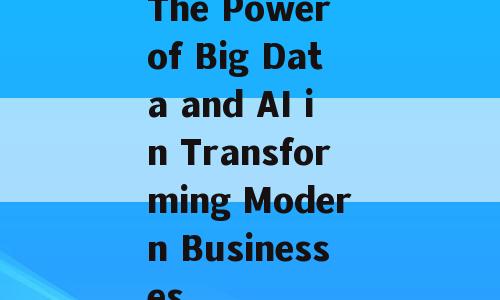In today's rapidly evolving digital landscape, the integration of big data and artificial intelligence (AI) has become a pivotal force in transforming modern businesses. This article delves into the significance of big data and AI, their applications across various industries, and the potential challenges that lie ahead.
Introduction
Big data refers to the vast amount of structured, semi-structured, and unstructured data that is generated from various sources such as social media, sensors, and transactions. AI, on the other hand, involves the development of machines that can perform tasks that typically require human intelligence, such as visual perception, speech recognition, and decision-making.
The Convergence of Big Data and AI
The convergence of big data and AI has led to groundbreaking advancements in various fields. Let's explore some of the key applications:
1、Predictive Analytics: By *** yzing vast amounts of data, businesses can predict future trends and patterns, enabling them to make informed decisions and optimize their operations. For instance, retail companies can leverage big data and AI to forecast demand, personalize customer experiences, and optimize inventory management.
2、Customer Insights: Big data and AI enable businesses to gain deeper insights into customer preferences, behavior, and needs. This information can be used to tailor marketing strategies, improve customer service, and develop innovative products and services.
3、Automation: AI-powered automation can streamline various business processes, reduce manual labor, and increase efficiency. For example, chatbots can handle customer inquiries 24/7, while AI algorithms can optimize supply chain operations and reduce costs.
4、Healthcare: In the healthcare industry, big data and AI are revolutionizing patient care, drug discovery, and disease diagnosis. By *** yzing vast amounts of patient data, AI algorithms can identify patterns and predict outbreaks, leading to better healthcare outcomes.
5、Energy and Utilities: The energy sector is leveraging big data and AI to optimize grid management, reduce waste, and improve sustainability. AI algorithms can predict energy consumption, identify inefficiencies, and optimize renewable energy sources.
Challenges and Concerns
While the integration of big data and AI offers numerous benefits, it also presents some challenges and concerns:
1、Data Privacy: The collection and *** ysis of vast amounts of data raise concerns about privacy and data security. Businesses must ensure that they comply with data protection regulations and implement robust security measures to safeguard sensitive information.
2、Ethical Considerations: AI algorithms can be biased, leading to unfair outcomes. Businesses must be aware of potential biases in their AI systems and work towards creating fair and unbiased models.
3、Skill Gaps: The demand for AI and big data professionals is rapidly increasing. Businesses need to invest in training and development to build a skilled workforce capable of harnessing the power of these technologies.
4、Regulatory Compliance: As big data and AI become more prevalent, governments and regulatory bodies are introducing new laws and regulations. Businesses must stay informed about these changes and ensure compliance.
Conclusion
The integration of big data and AI has the potential to revolutionize modern businesses across various industries. By leveraging the power of these technologies, businesses can gain competitive advantages, improve efficiency, and create new opportunities. However, it is crucial for businesses to address the challenges and concerns associated with big data and AI to maximize their benefits.
In conclusion, the fusion of big data and AI is a transformative force that can drive innovation and growth in the modern business landscape. As businesses continue to embrace these technologies, they must be proactive in addressing the challenges and ensuring ethical practices to harness their full potential.















还没有评论,来说两句吧...